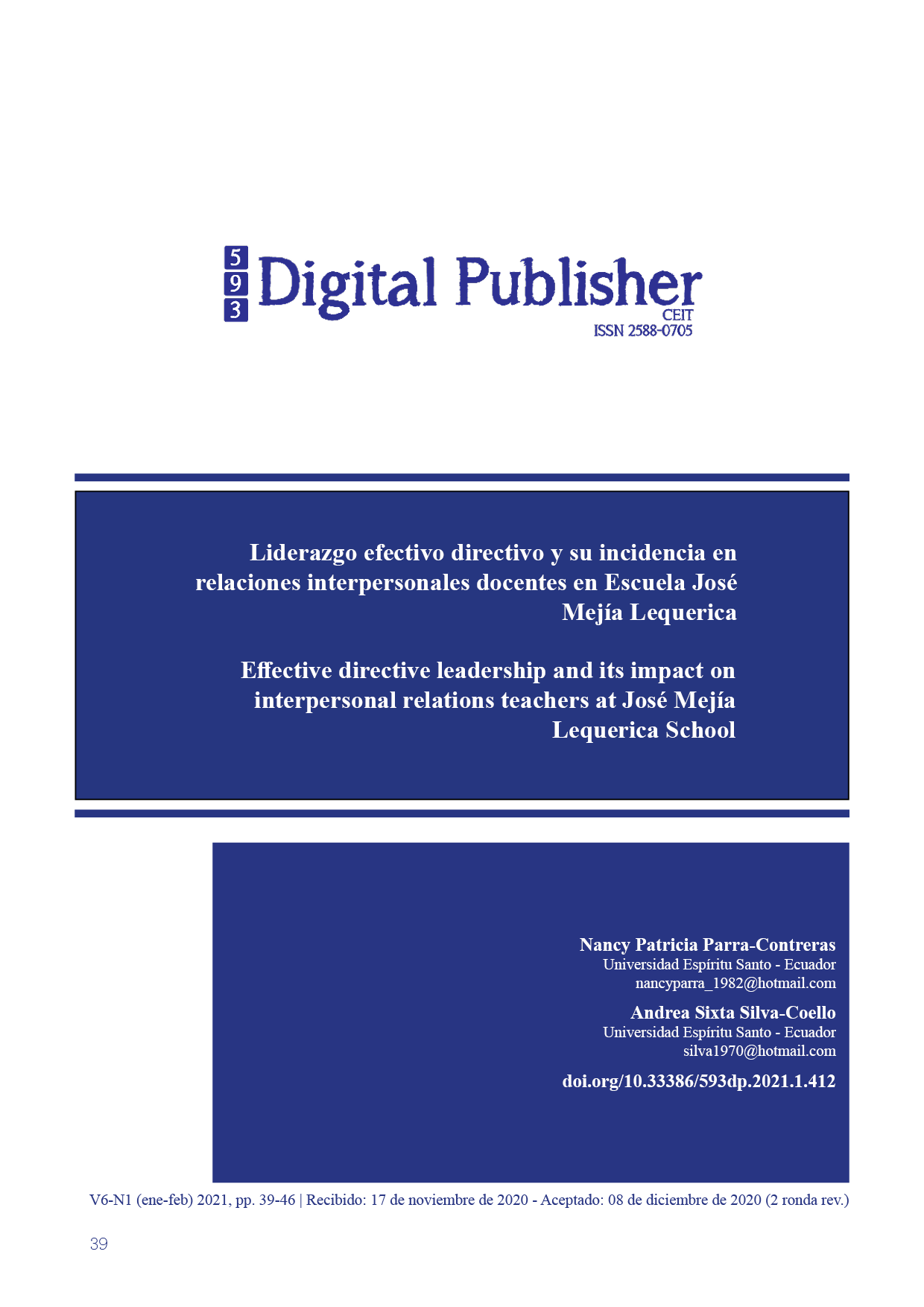Effective directive leadership and its impact on interpersonal relations teachers at José Mejía Lequerica School
Main Article Content
Abstract
Effective leadership of managers plays a critical role within educational institutions, as it is the predominant factor in meeting educational standards, which helps influence the models and reforms that must be implemented to promote quality education. This study aimed to design innovative effective leadership strategies to help educational managers positively influence teachers' interpersonal relationships, in order to improve the institutional working climate. For which a survey-type questionnaire based on leadership was used, which were taken from the Ecuadorian Ministry of Education's Educational Quality Standards Assessment Manual. The results indicated that within the educational unit 4 types of leadership were exercised that are authoritarian coercive with 50%, benevolent authoritarian with 25%, consultative 15% and participatory with 10%. Concluding that the implementation of an effective leadership plan helped the educational community of the José María Lequerica School to improve the working climate by increasing the skills, facilitating the development and dissemination of the institutional educational project for the benefit of society, promoting educational quality and increasing efficiency in the realization of their processes.
Downloads
Article Details

This work is licensed under a Creative Commons Attribution-NonCommercial-ShareAlike 4.0 International License.
1. Derechos de autor
Las obras que se publican en 593 Digital Publisher CEIT están sujetas a los siguientes términos:
1.1. 593 Digital Publisher CEIT, conserva los derechos patrimoniales (copyright) de las obras publicadas, favorece y permite la reutilización de las mismas bajo la licencia Licencia Creative Commons 4.0 de Reconocimiento-NoComercial-CompartirIgual 4.0, por lo cual se pueden copiar, usar, difundir, transmitir y exponer públicamente, siempre que:
1.1.a. Se cite la autoría y fuente original de su publicación (revista, editorial, URL).
1.1.b. No se usen para fines comerciales u onerosos.
1.1.c. Se mencione la existencia y especificaciones de esta licencia de uso.
References
Balda, R., & Guzmán, A. (2015). Liderazgo educativo transformacional como necesidad de las instituciones educativas en la República del Ecuador. Revista Formación y Calidad Educativa, 3(2), 109 - 115. ISSN 1390- 9010
Cancino, V., & Vera, L. (2017). Políticas educativas de fortalecimiento del liderazgo directivo: desafíos para Chile en un análisis comparado con países OCDE. Ensaio: Avaliação e Políticas Públicas em Educação, 25(94), 10. ISSN 1809-4465
Contreras, T. (2016). Liderazgo pedagógico, liderazgo docente y su papel en la mejora de la escuela: una aproximación teórica. Revista de Psicología Educativa, 4(2), 123-133. doi:https://dx.doi.org/10.20511/pyr2016.v4n2.123
Enríquez, M., & Calderón, J. (2017). El Clima Laboral y su Incidencia en el Desempeño del Personal Docente de una Escuela de Educación Básica en Ecuador. Revista PODIUM, 142(1), 134 - 143. ISSN: 1390 - 5473
García, J. (2016). El liderazgo en la gestión escolar, República de Ecuador. Revista Científica Dominio de las Ciencias, 2, 269 - 279. ISSN: 2477-8818
Jeon, L., & Ardeleanu, K. (2020). Work Climate in Early Care and Education and Teachers’ Stress: Indirect Associations through Emotion Regulation. Journal Early Education and Development, 31(7), 1031 - 1051. doi:https://doi.org/10.1080/10409289.2020.1776809
Hernández, A., & Bautista, G. (2020). Tipos de liderazgo en el contexto escolar. Revista Vida Científica, 8(16), 1-3. ISSN: 2020-4905
Hernández, R., Fernández, C., & Baptista, M. (2014). Metodología de la Investigación. México: Mcgraw-Hill.
Ministerio de Educación del Ecuador. (2018). Estándares de Calidad Educativa. Aprendizaje, Gestión Escolar, Desempeño Profesional e Infraestructura. Obtenido de Ministerio de Educación. Sitio web: https://educacion.gob.ec/wp-content/uploads/downloads/2013/03/estandares_2012.pdf
Rodríguez, E. (2017). Micropolítica escolar y el liderazgo directivo en la escuela. Revista Educación, 41(1), 12. ISSN 0379-7082
Sierra, G. (2016). Liderazgo educativo en el siglo XXI, desde la perspectiva del emprendimiento sostenible. Revista EAN. Rev. esc.adm.neg.(81), 111 -128. doi: http://dx.doi.org/10.21158/01208160.n81.2016.1562
Villalobos, C., Peña, J., Aguirre, E., & Guerrero, M. (2017). Liderazgo escolar y conflictos socioeducativos. Un estudio exploratorio en liceos públicos chilenos. Calidad en la educación (47), 12. doi:http://dx.doi.org/10.4067/S0718-45652017000200081



